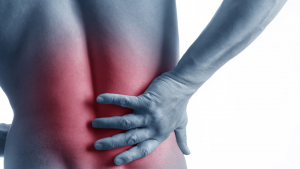
Water makes up 60-70% of the average person’s body weight, and is vital in many processes such as digestion, body temperature regulation and absorption of nutrients. In fact, skeletal muscle is actually composed of as much as 75% water in some people. (2) Given all this, it is shocking that plain water only makes up 48% of fluids consumed by Canadians per day! (3) In this blog, we’re going to share two major reasons why you should be drinking more water, and how you can figure out if you’re drinking enough or not.
Effects of Water Intake on Blood Pressure
Increased water intake has shown to have a lowering effect on blood pressure. In a Japanese study, 55 healthy adults took part in a study where half of the group drank two additional 550 mL bottles of water throughout the day on top of their usual fluid intake. After 12 weeks, results showed that the additional water intake did in fact have an effect on blood pressure, with significant decreases in systolic blood pressure observed by the researchers. The researchers attributed the decrease in blood pressure to three main factors:
- The first factor was the removal of excess sodium and water as a result of improved kidney function.
- The second factor was changes in the levels of blood pressure-related hormones such as renin and aldosterone, which are two hormones that act to increase blood pressure.
- The third factor was that the increased water intake led to less resistance in the arteries and veins.
Overall, water supplementation is showing promising signs as a means to lower blood pressure and could provide other health benefits as well. (1)
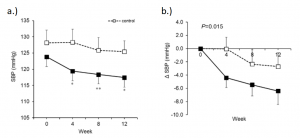
Figure 1. Changes in systolic blood pressure (SBP) over 12 weeks. Dotted line represents control group (adults who did not undergo water supplementation), and solid line represents intervention group (adults who underwent water supplementation). Significant changes were seen in SBP over 12 weeks in adults in the intervention group.
Effects of Water Intake on Skeletal Muscle Mass
Water intake has also shown to be a key factor in the battle against sarcopenia. As we explained in a previous blog post, sarcopenia refers to the loss of skeletal muscle mass and strength in an individual who is aging. This progressive reduction in lean muscle leads to decreases in mobility and independence, as well as, increasing the individual’s risk for other health conditions. A study from Korea investigated the relationship between water intake and skeletal muscle mass in elderly people. 3656 participants were examined, and in both sexes, water intake was significantly lower in participants with sarcopenia compared to those who still had healthy amounts of muscle mass.

This is not surprising, as dehydration in the elderly is linked to many other health issues such as ulcers, delirium, constipation, urinary tract infections and renal failure. In addition to sarcopenia, dehydration in elderly Koreans was also associated with decreased food intake, leading to lower levels of physical activity and abilities to complete activities of daily living.
Overall, this shows the importance of adequate water intake as it relates to muscle mass and activity levels, and shows how important it is in order to stay hydrated in order to prevent dehydration-related complications, including sarcopenia. (2)
To sum it all up…
Overall, adequate water consumption is vital in living a healthy, active life and can aid in the prevention of health conditions such as hypertension and sarcopenia. The Canadian Physical Activity Guidelines recommend that all adults should accumulate at least 150 minutes of moderate- to vigorous-intensity aerobic physical activity per week, in bouts of 10 minutes or more. (4) Make sure to stay hydrated as you exercise!
Dr. Hardie and the rest of the team have been on a mission to improve their water intake recently! To calculate how much water you need per day based on your body weight and exercise levels, take a look at the tables underneath, or click the link below to use the calculator and find your exact recommended water uptake.
Water Calculator
If you exercise for 0 minutes/day, you should be drinking…
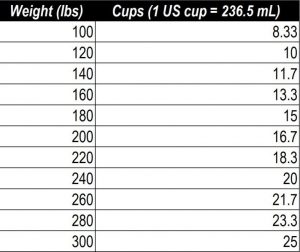
If you exercise for 30 minutes/day, you should be drinking…
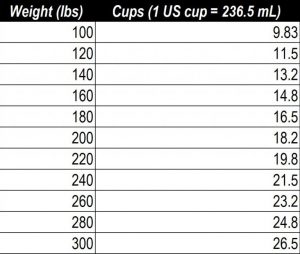
If you exercise for 60 minutes/day, you should be drinking…
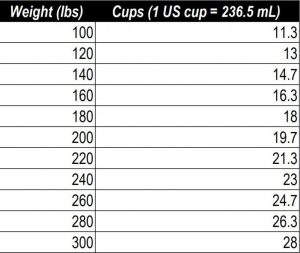
References
1. Nakamura, Y., Watanabe, H., Tanaka, A., Yasui, M., Nishihira, J., & Murayama, N. (2020). Effect of Increased Daily Water Intake and Hydration on Health in Japanese Adults. Nutrients, 12(4), 1191. https://doi.org/10.3390/nu12041191
https://www.ncbi.nlm.nih.gov/pmc/articles/PMC7231288/
2. Yoo, J.-I., Choi, H., Song, S.-Y., Park, K.-S., Lee, D.-H., & Ha, Y.-C. (2018). Relationship between water intake and skeletal muscle mass in elderly Koreans: A nationwide population-based study. Nutrition, 53, 38–42. https://doi.org/10.1016/j.nut.2018.01.010
https://www.sciencedirect.com/science/article/abs/pii/S0899900718300315?via%3Dihub
3. Jones, A. C., Kirkpatrick, S. I., & Hammond, D. (2019). Beverage consumption and energy intake among Canadians: analyses of 2004 and 2015 national dietary intake data. Nutrition Journal, 18(1). https://doi.org/10.1186/s12937-019-0488-5
https://nutritionj.biomedcentral.com/articles/10.1186/s12937-019-0488-5
4. CSEP. (2020). Canadian Physical Activity Guidelines. CSEP. https://csep.ca/CMFiles/Guidelines/CSEP_PAGuidelines_0-65plus_en.pdf.
https://csep.ca/CMFiles/Guidelines/CSEP_PAGuidelines_0-65plus_en.pdf
All images were taken from unsplash.com

